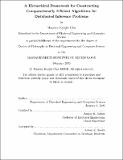| dc.contributor.advisor | Sanjoy K. Mitter. | en_US |
| dc.contributor.author | Chu, Maurice Kyojin, 1973- | en_US |
| dc.contributor.other | Massachusetts Institute of Technology. Dept. of Electrical Engineering and Computer Science. | en_US |
| dc.date.accessioned | 2005-05-19T15:15:56Z | |
| dc.date.available | 2005-05-19T15:15:56Z | |
| dc.date.copyright | 2003 | en_US |
| dc.date.issued | 2003 | en_US |
| dc.identifier.uri | http://hdl.handle.net/1721.1/16912 | |
| dc.description | Thesis (Ph. D.)--Massachusetts Institute of Technology, Dept. of Electrical Engineering and Computer Science, 2003. | en_US |
| dc.description | Includes bibliographical references (p. 389-391). | en_US |
| dc.description | This electronic version was submitted by the student author. The certified thesis is available in the Institute Archives and Special Collections. | en_US |
| dc.description.abstract | In this thesis, we present a methodology for designing computationally efficient algorithms for large-scale inference systems on system architectures with distributed autonomous agents. The principle of information-based computation is the underlying idea driving elements of this methodology. The methodology consists of a layered information processing architecture, which organizes specific inference tasks into layers so that the information extracted from these tasks can be exploited to design an efficient inference system, and the hierarchy, which is a representation combining elements of circuits and branching programs from which efficient distributed local algorithms implementing global tasks on general system architectures can be generated. The general issues addressed by this methodology are: (1) how to efficiently collect distributed information for estimation when collecting information is expensive, (2) how to distribute a global algorithm among multiple agents, and (3) how to take advantage of prior computations to aid in subsequent computations. To demonstrate that the methodology is a good one, we present an application of sensor networks to battlefield awareness. The problem is to gain intelligence about targets in the environment from the information collected by a set of sensor nodes which are distributed over a field and have real physical constraints on energy and communication. In particular, solutions to the problem of information collection for target localization and the problem of multiple target tracking and classification are formulated and demonstrated using the proposed methodology. | en_US |
| dc.description.abstract | (cont.) Difficult problems such as the data association problem in multiple target tracking are handled when possible by the careful design of interactions between layers of an appropriately constructed layered information processing architecture. | en_US |
| dc.description.statementofresponsibility | by Maurice Kyojin Chu. | en_US |
| dc.format.extent | 391 p. | en_US |
| dc.format.extent | 5703982 bytes | |
| dc.format.extent | 5733665 bytes | |
| dc.format.mimetype | application/pdf | |
| dc.format.mimetype | application/pdf | |
| dc.language.iso | eng | en_US |
| dc.publisher | Massachusetts Institute of Technology | en_US |
| dc.rights | M.I.T. theses are protected by copyright. They may be viewed from this source for any purpose, but reproduction or distribution in any format is prohibited without written permission. See provided URL for inquiries about permission. | en_US |
| dc.rights.uri | http://dspace.mit.edu/handle/1721.1/7582 | |
| dc.subject | Electrical Engineering and Computer Science. | en_US |
| dc.title | A hierarchical framework for constructing computationally efficient algorithms for distributed inference problems | en_US |
| dc.type | Thesis | en_US |
| dc.description.degree | Ph.D. | en_US |
| dc.contributor.department | Massachusetts Institute of Technology. Department of Electrical Engineering and Computer Science | |
| dc.identifier.oclc | 52643027 | en_US |
